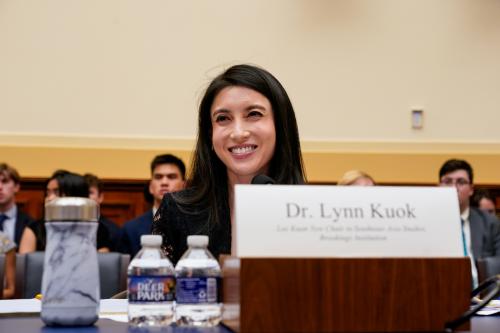The Bush administration’s rhetoric about bringing freedom to the people of North Korea and the Middle East is intended to sow the seeds for a future democratic peace in both regions. But the soil remains infertile. As we have seen recently in Palestine, Iran and Iraq, free elections do not automatically lead to democracy.
A new tone – and strategy – are needed. This starts with a more realistic appreciation of the forces that drive regional powers to arm and threaten their neighbors – namely, strident nationalism, racial ideology and volatile borders.
The issue is not whether the leaders of these countries are wicked or misguided, whether democracy is a superior form of government or whether America should champion freedom around the world.
Rather, the central problem for today’s diplomacy is the very practical one of finding a way to prevent armed conflict while eliminating over time the political, social and economic sources of internal unrest. The two aims always have been closely connected, but their interplay is more consequential than ever in today’s globalizing world.
Fortunately, we have been here before. The great achievement of the late 20th century was an interdependent, democratic and prosperous Europe, at peace with itself and the rest of the world.
The long, difficult process of building a stable 20th–century peace after 1945 witnessed a good deal of rhetoric about liberating the world from godless communism, to be sure. But that was accompanied by several measures that transformed a tenuous balance of rival powers into a genuine security community. In Western Europe, NATO and the European Union created the conditions for a stable peace. It was only natural that this system grew to embrace nearly all of Europe.
One of the most significant contributions to a Europe whole and free was made by the 1975 Helsinki Final Act, which established the Conference on Security and Cooperation in Europe. Now known as the OSCE (the “conference” became an “organization” in 1995), this mechanism has served both America and Europe very well over the decades. Beginning as a charter reaffirming the sanctity of borders and human rights, the OSCE today continues to provide a stable context in which to settle disputes, air differences and make tradeoffs on a regional basis.
Northeast Asia and the Middle East desperately need a similar arrangement. Of course, both are very different from Europe, and the OSCE cannot, and should not, be replicated there. But the principle behind it is relevant to both these other regions. Each lacks anything like a permanent security mechanism required to forestall national rivalry. The pattern of relationships there is not too different from the one that characterized Europe at the turn of the 20th century. We all know where that led.
There are several proposals on the table in both regions that would include designated nuclear–free zones in Korea and in the Persian Gulf area, including Iran. The South Koreans and Saudis, in particular, have each recently offered innovative ideas for comprehensive regional security communities.
The United States should be giving its enthusiastic endorsement to these ideas. If it did, much could be accomplished by transformative diplomacy. But this is badly lacking. Rather, we have ceded diplomatic momentum – not to mention popular legitimacy – to reactionary movements such as Hamas, the multiple parties opposing our mission in Iraq and China’s backers of the status quo.
Charters for security cooperation in these regions should include provisions for military transparency, elimination of weapons of mass destruction, the free movement of people and ideas, and energy-sector cooperation. Beyond that, the substance of the charters should be determined by the realities on the ground.
And here we must remember that the process may be just as important as the outcome. The more regional powers begin to work with one another instead of relying upon the intervention or the jawboning of outsiders, the safer they – and we – will be.
The Brookings Institution is committed to quality, independence, and impact.
We are supported by a diverse array of funders. In line with our values and policies, each Brookings publication represents the sole views of its author(s).



Commentary
Op-edChart New Course for Lasting Peace
February 27, 2006